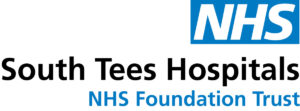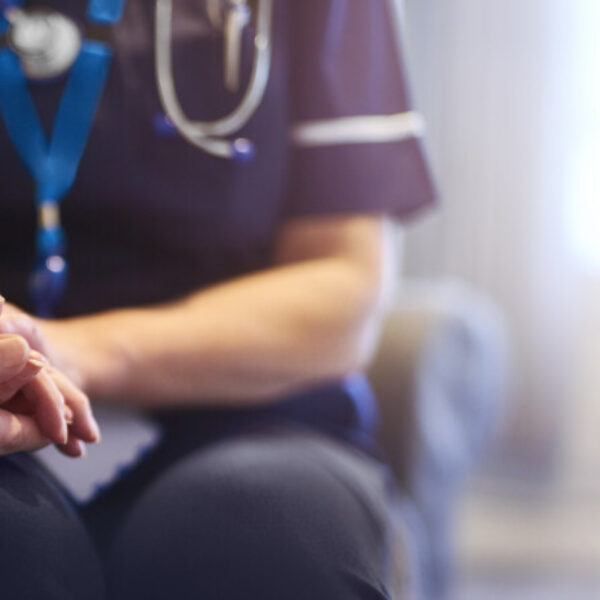A day in the life of a Cancer Clinical Nurse Specialist – Emily Rees

To mark the first National Cancer CNS Day on 15/03/2022, we are featuring two members of this amazing workforce in our Alliance blog. Emma and Emily have shared with us what a typical day in this role can look and feel like. In this second of the two blogs we feature Emily. We are sure you will agree that her passion and commitment to her patients and the care she gives, comes through in absolute bucket loads.
Thank you for your time in producing this blog Emily, and a massive thank you to you and the rest of the Cancer CNS workforce for all you do for cancer patients and their families across our region.
Introducing Emily:
I am Emily, I am a Macmillan Neuro Oncology Cancer Specialist Nurse working at The James Cook University Hospital in Middlesbrough. I qualified in 2008, starting in general surgery and then after a couple of years I moved to cancer services.
I have held various roles in cancer services, including a specialist nurse in sarcoma. After relocating to the North East, I joined my current team 6 years ago and I have been in this role for the last year. As well as taking on this new role, I am also a new working mum. I came back from maternity leave into a new senior role so it has been a very challenging time!
Why did you choose to become a Cancer Clinical Nurse Specialist?
When I worked in surgery, I would care for patients for one very small part of their cancer journey. I always knew that there was more to their treatment pathway and I wanted to understand more about their whole experience of care.
This is what led me to my first role in cancer services which was in oncology outpatients. This was a whole new experience for me, being with the patient from the point of diagnosis right through their journey. It really opened my eyes to everything a cancer patient can experience. I felt like I had found my place and somewhere I could make a difference. I feel really lucky to have this type of role.
What does a typical day look like for you Emily?
A typical day would start with a multidisciplinary team meeting which involves the whole team. We discuss all the new patient referrals, and patients who are at various stages of their treatment to agree on an individualised plan of care for each patient going forward. The care of a cancer patient cannot be done by just one person and this meeting is a great opportunity to share different perspectives on the patient journey.
In the afternoon we would attend our clinics. As Cancer Nurse Specialists we will attend all new diagnosis appointments, new histology appointments, or anyone undergoing treatment or patients who might be receiving distressing news after a follow-up scan. We would want to be alongside our patients in these situations.
Later on, we will liaise with various health professionals in respect of a patients’ treatment and care. It is essential that we ensure that everyone involved in a patients’ treatment pathway and holistic care is kept informed.
We also look after our patients who are based at home, contacting them on the phone. This can involve managing patients on steroid treatment and supporting patients with additional care needs if they experience a deterioration in their functionality.
We visit patients on our wards post operatively to make sure everything is in place for their discharge. We also provide professional education and ensure that colleagues know where we are to ask for advice.
As specialist nurses we work autonomously as independent practitioners but are well supported by our multidisciplinary team and we routinely work together to share our expertise to provide excellent holistic care to our patients.
As part of this, our role often goes beyond direct patient care to working with senior service management and lead nurses along with engagement from service users to help develop our service and make improvements at policy/procedural level which have a long term impact on patient care.
This often involves having to be aware of the business aspect of healthcare delivery, which I personally find fascinating and I enjoy the challenge of having to demonstrate how a change can be positive for patients, the organisation and the clinical team. This is a great opportunity to demonstrate effective, compassionate clinical leadership and something I feel proud to be a part of.”
What do you think your support means to the patients you care for?
We follow our patients from the very start right through their whole journey. I feel really lucky that we get to do that. We get to build strong relationships with our patients and their families, you are able to act as the advocate for them. They know that they can turn to us and that we are always there for them.
When you hear the feedback from patients and their families to thank you for what you have done for them, that’s when you remember why you do this role and why you are here.
What do you enjoy most about your role?
For me, it is when you get to see someone go through their whole treatment journey and then come out of the other side. To be with someone through the challenging times and then to be with them during the joy and happiness is what I really enjoy the most, seeing them returning back to their life.
We are really lucky that on the tough days we have good support mechanisms. We have a robust peer support system in cancer services and we are well supported by the psychologist. Having an ability to cope with the challenging and emotional days is a skill that you develop over time. This is something I always make sure I tell our more junior members of staff.
What would you say to someone who is considering becoming a Cancer Nurse Specialist?
If someone is interested in the role of Cancer Nurse Specialist, I would recommend that they spend time with a team, see how they work. Try and get an understanding of the patient journey and all aspects of their care.
This role provides a real opportunity for continual learning. No two days are ever the same, and there will always be something new to experience and learn about. Be prepared for the emotion and the real responsibility you feel in this role for your patients but please come, please do it. We need people who have the passion, the drive and the will to enhance and enrich the experience of someone going through one of the most challenging times of their lives. It is a privilege to do this job.
For early signs and symptoms information please access the links below:
Brain tumours – Macmillan Cancer Support
